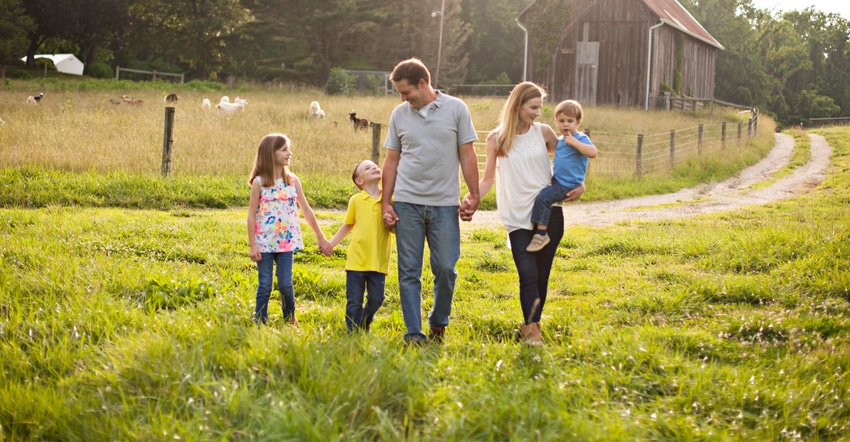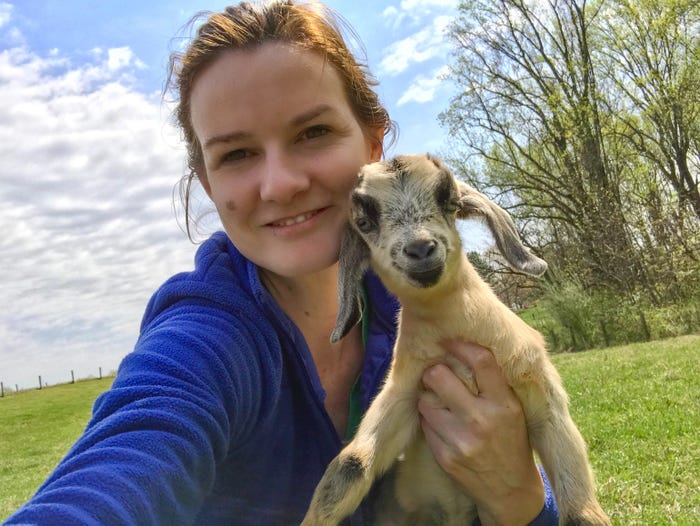August 22, 2018

There is a new breed of young farmer that I like to call "Young Farmers, Plus."
These young farmers didn’t choose between the farm, corporate agriculture careers and agricultural advocacy. They do it all. They are young farmers, plus an entire array of other things: agricultural advocates, volunteers, legislators and more. Sometimes they come from a family farm, start their own operation or marry into a farm family. But they all have one thing in common: passion.
In farming, passion is the only thing that will keep you going. That and lots and lots of coffee.
One farmer who fits the bill of a Young Farmer Plus is Jamie Clark Tiralla, a livestock farmer and owner of her own successful agricultural marketing business. Clark Tiralla helps run Monnett Farms, a fourth-generation farm in Prince Frederick, Md., with her husband, Benson, and their three young children. The family raises grass-fed beef cattle, and pasture-raised pork, lamb and goat.
 AG UPBRINGING: Jamie Clark Tiralla has two sons, Henry and Isaac, who are being raised to love agriculture in a county just outside Washington, D.C.
AG UPBRINGING: Jamie Clark Tiralla has two sons, Henry and Isaac, who are being raised to love agriculture in a county just outside Washington, D.C.

So, what makes Clark Tiralla tick and drives her passion for farming?
I recently sat down with Clark Tiralla at her farm:
So, first of all, correct me if I’m wrong, but I think passion plays a big part in the ‘why.’ Is that what drives you?
Passion is the one thing that you can't learn. So, you have to have that as a foundation. You can learn just about any other skill. But passion is something you have to have on your own. In my case, I had no idea I was passionate about agriculture until I moved to the farm with my husband 11 years ago. So, maybe you also have to be curious. One of my strengths is learning, and that's a big part of what drives me. I'm always hungry to meet new people and learn new things.
From a personality standpoint, have you always been a go-getter? Someone who can’t sit still? Or did this develop with age?
No, I definitely was not what you would have described as a go-getter. In fact, I was very shy growing up. It's been a lot of hard work for me to get to the point where I feel comfortable being a public-facing advocate. Even after getting involved in agriculture, I was very content to do my work behind the scenes. It's only recently that I've felt comfortable enough to get out there and start talking about my own story.
Can you explain how you went from a suburban kid who transitioned into farming?
I tell people that I was just really naive and optimistic. I met my husband after I came back from gemology school in San Diego and we were just inseparable. He said he wanted to move to his family's farm after we got married and I was enthusiastic. The first few years were an adjustment period for me, learning about what happens on a farm and building a business together, and of course learning to navigate that with other family members who were involved. My involvement in the Farm Bureau was intentional to help me learn and build a support network.
How did you and your husband build the business?
Even though this is his family's farm, Benson did not grow up in a farming family. His father is a doctor and his mother a nurse. He and his brothers were involved in 4-H as kids, but that's about it. His grandfather grew tobacco until the early 1990s, but the farm was pretty much a blank slate when we moved here. Benson wanted to raise livestock and I thought it was a good idea. We went to a lot of conferences to learn more about different breeds of livestock and pasture growing systems. We read a ton of books. We tried things; some worked and some didn't. But we tried to learn from each experience and constantly look for ways to improve. I came in with a business mindset. My father is an entrepreneur and my early career was spent managing a small family jewelry store. I understood that you had to experiment and when things didn't work, move on. There's no such thing as giving up.
With all that you do, what is it like to be farming at a young age and juggling raising a family?
It's difficult. I think having a family is challenging in general. But you add the stress of having a farm business on top of that and it really compounds anxieties. We definitely don’t have the answers. It's just like with the business, though. I think we try to learn from the mistakes we've made and get better. Benson and I want to help each other be the best versions of ourselves. And we want to help our kids be the best versions of themselves. I try to focus on that constantly. We don't always do the best job, but I try not to get hung up on the little things and make time for the things that matter. Sometimes that means that the fence lines get overgrown and the tree that fell sits out longer than it should. But if we don't have a strong family, we don't have a strong farm. So, at the end of the day, family comes first. Hopefully we have many years ahead of us to continue building the farm. Kids grow up and move away, but the land will always be here for us.
Can you share some of your current success and challenges regarding the farm business?
I'm really proud of the lamb business that we're building. We raise St. Croix sheep and we've grown that herd considerably from the handful of sheep we bought a few years ago. I enjoy being in the niche meat business. We're not selling the meat that you eat every night, rather the meat you buy for a special occasion or when you want to try something new. It's really fulfilling to be part of that experience for people. The challenge for us is balancing life and work with the farm. Of course, we want to grow and get bigger, but the timing on that is challenging. Our kids are growing up and they need more from us. Sometimes it's difficult to sit back and be content with where things are, but that's necessary. So right now, I'm just trying to be ok with where we are and looking ahead to the future and things we'd like to add to the farm.
Can you list for me all that you do: home, career, boards and commissions, freelance, social media.
I doubt you have enough time or space for me to list everything. As for the highlights, first and foremost, I'm a wife and mother of three beautiful children. My husband and I own a farm and I also own a marketing company. I am on the board of directors for the Maryland Farm Bureau, vice president of the Calvert County Farm Bureau, board member of the Chesapeake Alliance for Sustainable Agriculture, and member of the Maryland Department of Natural Resources Rural Legacy Advisory Board. There are other things woven in there, but those are some of the key positions I hold.
 GOAT SELFIE: Among the animals being raised at Monnett Farms are Kiko goats.
GOAT SELFIE: Among the animals being raised at Monnett Farms are Kiko goats.

My theory is that it takes a somewhat magical combination of drive, organizational skills, a supportive spouse and a larger purpose-driven network. Do you agree? What are your thoughts?
I think it takes optimism and faith. I certainly couldn't do what I do without my husband and our family. They are the support network that keeps things moving when I'm off doing advocacy work. And I definitely do what I do for others, not just myself. But I think what keeps me going is a positive outlook and goal-oriented mindset.
How do you manage the day-to-day activities of your life? Do you have a system or tools that make it easier?
I am actually not much of a planner. It drives a lot of people crazy, especially my husband. I'm self-employed because I need to have flexibility to do a lot of different things. I get very bored doing the same thing every day. I do use lists to stay organized and I try to carve out an hour every morning to just think through what needs to be done and make priorities. One key tool is the Cozi calendar app, which my husband and I use to keep track of all the things we do. It's a shared calendar and whenever something comes up, we just add it to the calendar. I have it set to send me weekly notifications so that on Sunday I can see a forecast of the week's schedule. That really helps us manage family and farm tasks alongside our other responsibilities.
And lastly, at what point do you reach saturation? Do you think you will stay this involved in the near and distant future?
Burnout is something that every advocate should worry about and be aware of. My strategy to manage this is to be a cheerleader for other leaders and help strengthen the network of advocates in agriculture. This way, no one has to work harder than they need to. A rising tide lifts all ships. I want to be a part of the wave that carries this movement forward.
About the Author(s)
You May Also Like




